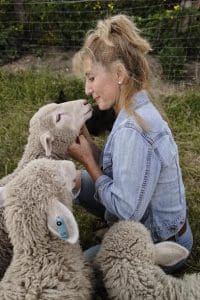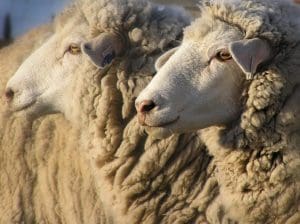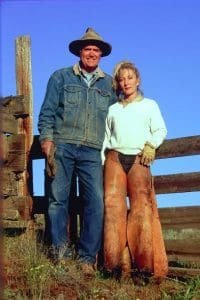
Imperial Stock Ranch’s Jeanne Carver with lambs, Picture – Paul Thacker.
THE first American sheep farm to be certified to produce wool under Textile Exchange’s Responsible Wool Standard — Imperial Stock Ranch – is a seasoned ‘farm-to-fork’ and ‘ranch to runway’ performer.
Global public health organization NSF International has certified Imperial Stock Ranch at Shaniko in north-central Oregon as the first U.S.-based farm under the Responsible Wool Standard.
NSF International’s general manager for sustainability Jenny Oorbeck said NSF International is pleased to announce the certification of Imperial Stock Ranch to the Responsible Wool Standard.
“The certification of Imperial Stock Ranch to the Responsible Wool Standard by NSF International confirms its commitment to animal welfare, land management and traceability of the wool it produces, providing consumers with the most responsibly sourced wool products on the market.”
Consumers are driving the future
Imperial Stock Ranch co-owner Jeanne Carver said Imperial Stock Ranch understood its role as a responsible producer of wool, from the health of the sheep to the hand-picked shearers who have worked at the ranch for decades.
“Certification to the Responsible Wool Standard demonstrates our commitment to animal welfare and land management practices.”

Sheep on Imperial Stock Ranch. Picture – Imperial Stock Ranch.
Ranch owners Dan and Jeanne Carver have been on a value-added marketing with their lamb and wool journey since 1999.
“We have been at the leading edge of ‘farm-to-fork’ and ‘gate-to-plate’ as we say over here, and what I have also termed ‘Ranch to Runway,’ Jeanne Carver said.
She said the ranch moved from selling “commodity wool” to selling wool through value-added products, either as yarn or finished goods in 1999.
“We did this both under our own label, but also in cooperation with brands in both the apparel and home goods markets.
“It was at the suggestion of a brand partner in the apparel industry, that we pursued RWS certification,” she said.
“I absolutely believe that there will be a segment of the market that will require certified wool.
“Consumers are driving the future with their purchasing dollars, and brands are at risk in their sourcing and supply chain decisions.”

Dan and Jeanne Carver. Picture – Imperial Stock Ranch.
Jeanne Carver said a third party certified program gave a level of assurance to brands and consumers that at the origin of wool products, the land and animals are being treated responsibly, and verified the traceability of that certified wool through the supply chain and into the product.
“We are in a new era of worthiness, transparency and accountability.
“Purchasers have choices, and certified wool will be an important segment of the wool market in the future.”
The Carvers run a Columbia/Rambouillet x Merino sheep program, producing wool in the 21-22 micron range.
RWS ensured wool is fully traceable
NSF International said the voluntary global standard demonstrated that a ranch or farm practiced the highest levels of animal welfare and land management, and that the wool is fully traceable throughout its supply chain.
NSF International said RWS required all sites that handle wool, from farms to the final manufacturer, to be certified. Only products containing 100 percent certified wool can be labelled with the RWS logo. Certification to RWS ensured the sheep are responsibly treated following the Five Freedoms, according to the Farm Animal Welfare Council. These include freedom from hunger and thirst; freedom from discomfort; freedom from pain, injury or disease; freedom to express normal behaviour and freedom from fear and distress. Certified RWS wool producers do not mules their sheep.
Certification to RWS also confirmed that a farm or ranch follows enhanced land management methods that protect soil health, biodiversity and native species. Certification includes on-site audits for all entities throughout the supply chain, from the farm or ranch to the manufacturing facility. Continued certification requires annual surveillance audits.
NSF International was part of the pilot process for the development of RWS, conducting audits at two separate ranches, including Imperial Stock Ranch, during critical times of the sheep life cycle. After completion of the pilot process, Imperial Stock Ranch began the certification process.
NSF International is an independent organization that writes standards, tests and certifies products for the construction, food, water and commercial and consumer goods industries to minimize adverse health effects and protect the environment. Founded in 1944, NSF is committed to protecting human health and safety worldwide. NSF is a World Health Organization Collaborating Centre for Food and Water Safety and Indoor Environment.
Click here for a link to the Imperial Stock Ranch website.
Sources: NSF International and Imperial Stock Ranch.

I am thrilled to hear that this wool is produced from animals raised to high welfare standards but question whether supplements are from genetically-modified grain etc?
Having recently seen footage on USA animal intensive rearing with the horrors of antibiotic use, hormone implants for weight gain and GM food, I decided that I would research the source of any USA products, as I do not wish to become part of that inhumane market. I will be interested in hearing about GM fodder. Full names required in future for reader comments please Jane, as per our long-standing comments policy: https://www.sheepcentral.com/about-us/sheep-central-comment-policy/ Editor.
Glenn, you are on the right track. This is just another money-making racket, just like PETA, a complete waste of time and money.
Hi Glenn, if you care to Google their property name you will find a bit about their operation. Not sure how numbers matter. Even smaller places here in Australia need to adhere to standards, but some don’t. You run a well-oiled operation with good welfare — by choice and training. Well done to you and well done to these people who choose to adhere to a system of good welfare.
This is fabulous news. I hope the process is implemented here in Australia as well.
And how many bales do they cut, how many lambs are sold and what are the lambs’ names?